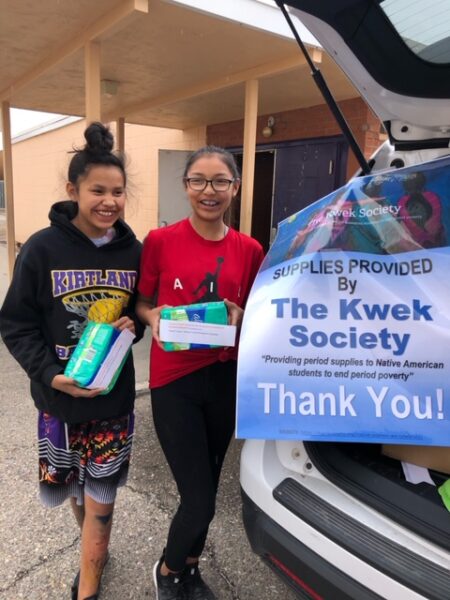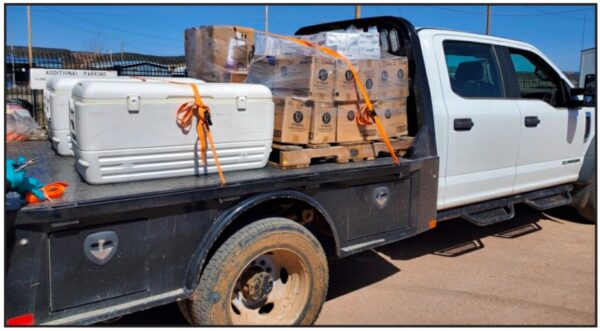
- Details
- By Rich Tupica
ARLINGTON, Virg. — The Kwek Society (Kwe’k means “women” in Potawatomi) wakes up every morning with the same mission: supplying Native women with products they desperately need. The nonprofit, which formed in 2018, provides tampons, pads and other menstrual supplies to Native American communities across the country who lack access to these expensive products. The organization also provides educational materials and raises awareness about period poverty in Native American communities.
Now, the organization is asking others for a little help, as it’s a finalist for a $50,000 grant via Give A Brand. All are welcome to vote once a day through June 11, at this link. It takes under 30 seconds to vote.
 Kwek photo in Shiprock distributing period supplies. (courtesy photo)
Kwek photo in Shiprock distributing period supplies. (courtesy photo)
Among the five finalists, The Kwek Society is the only competitor that exclusively addresses Native communities.
If The Kwek Society wins the vote, the prize money will be spent on branding services from a New York City creative agency called ThinkSo, according to Kwek founder Eva Marie Carney (Citizen Potawatomi Nation). Carney said she hopes to get ample voting support this week from those in Indian Country who back the group’s honorable cause. “Winning the Give A Brand campaign would get The Kwek Society professional help with its online presence and marketing efforts – expanding its reach to more Native students and communities,” Carney said. “With your voting help each and every day through June 11, The Kwek Society can reach more Native American students and communities needing period supplies — ensuring dignity.” As for the organization’s long term, Carney said she has plans for exponential growth, with the goal of eradicating period poverty in Native American communities. She said she also plans to draw on Think So’s expertise to fulfill her dream of developing and posting “culturally-appropriate menstruation and puberty materials and traditional teachings” on the kweksociety.org site.
“We need your help to do more for our relatives who can’t afford menstrual care supplies” Carney said.
Carney said she started The Kwek Society from her home in Arlington, Va. two years ago to get menstrual hygiene supplies to Native students who otherwise might miss days of school each month when they were on their periods. The group initially focused on rural reservation schools, recognizing the long distances to stores to buy supplies, the lack of reliable transportation for many families, the socioeconomics of many families and the limited finances of these schools.
Today, the nonprofit has partnerships with nearly 40 schools and organizations (many rural, some in cities) that distribute materials provided by The Kwek Society.
The growing list of partners are nationwide, including spots in Maine, New Mexico, Oklahoma, Oregon, South Dakota, Wyoming and Ontario, Canada, as well. Of course, COVID-19 has complicated its mission, but not halted it.
While schools shuttered due to covid19, The Kwek Society switched gears and began providing products to schools and organizations making food distributions to their communities. Pads and tampons are now offered to students and their families, along with bags of food and jugs of water.
Since the onset of the pandemic, Carney said she has also solicited donations of masks sewn by the nonprofit’s supporters for distribution within hard-hit Navajo Nation communities for elders and community workers. “In the last three months, March through May, The Kwek Society has sent 15,500 pads, 8500 tampons and 500 masks, and helped facilitate donations of another 6,000 masks, through the group Protect Native Elders and Days for Girls International. In addition to operating The Kwek Society, Carney works as a human rights lawyer and holds elected office as a legislator for the Citizen Potawatomi Nation. She said she represents the Nation’s citizens who live in the 13 mid-Atlantic and southern states and the District of Columbia. Carney earned her BA at the University of San Francisco and her Juris Doctor from Stanford Law School.
To learn more, visit kweksociety.org.
More Stories Like This
End of Enhanced Obamacare Subsidies Puts Tribal Health Lifeline at RiskSanta Ynez Tribal Health Clinic to Host Free Pediatric Dental Clinic
Rez Vet Earns Global Recognition for Serving Navajo Nation's Animals
Chickasaw Nation Governor Bill Anoatubby leads groundbreaking for pediatric clinic
Cherokee Nation Eyes $4 Million Transitional Housing Program
